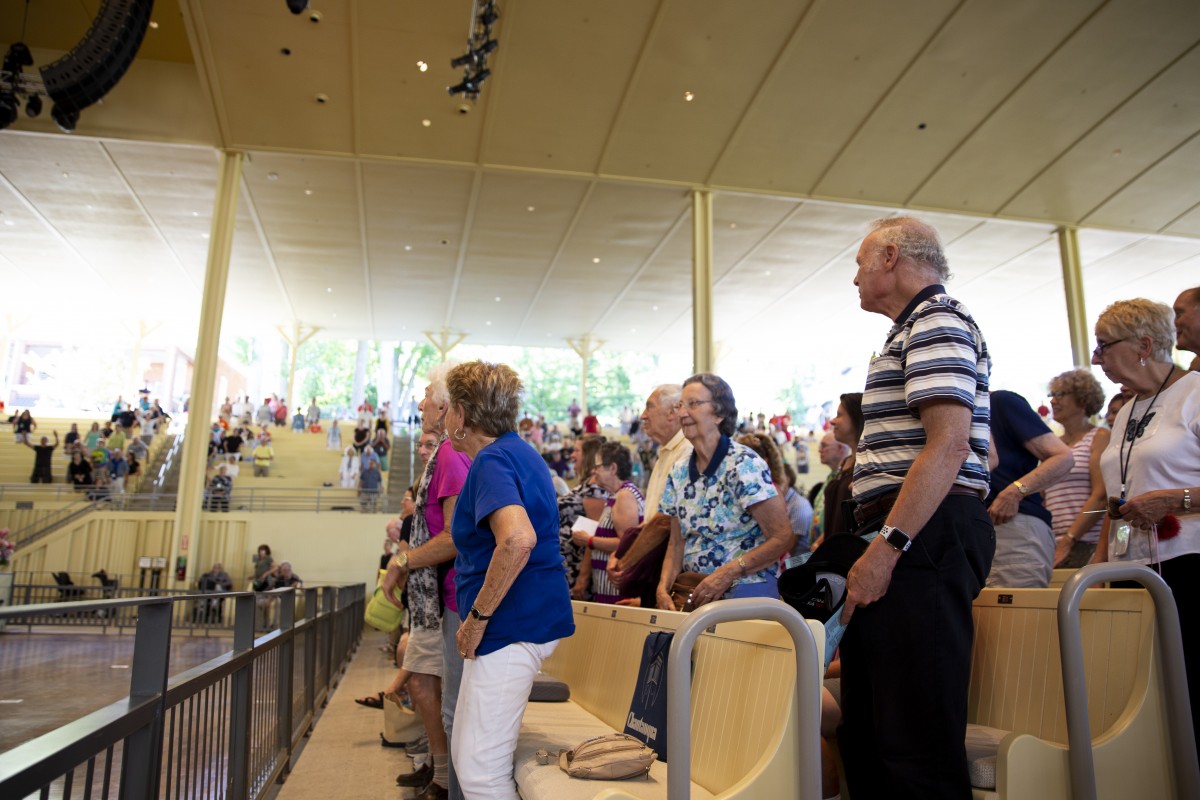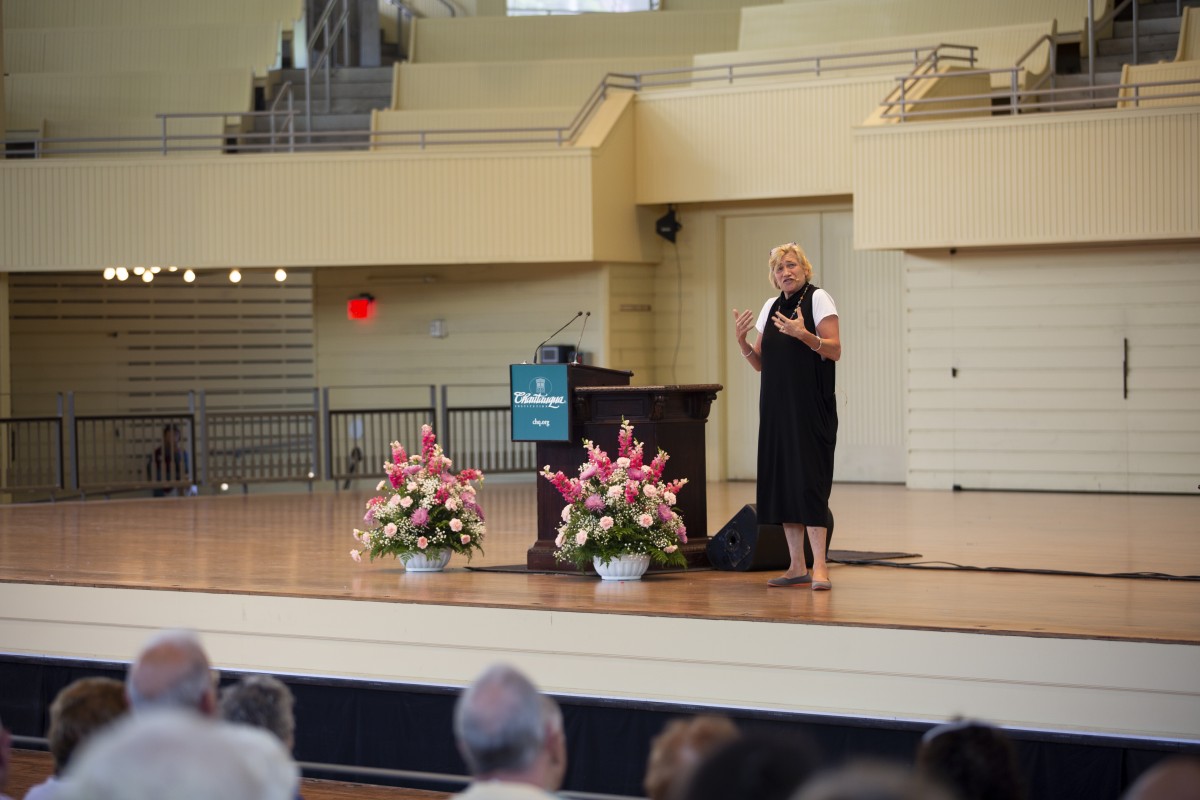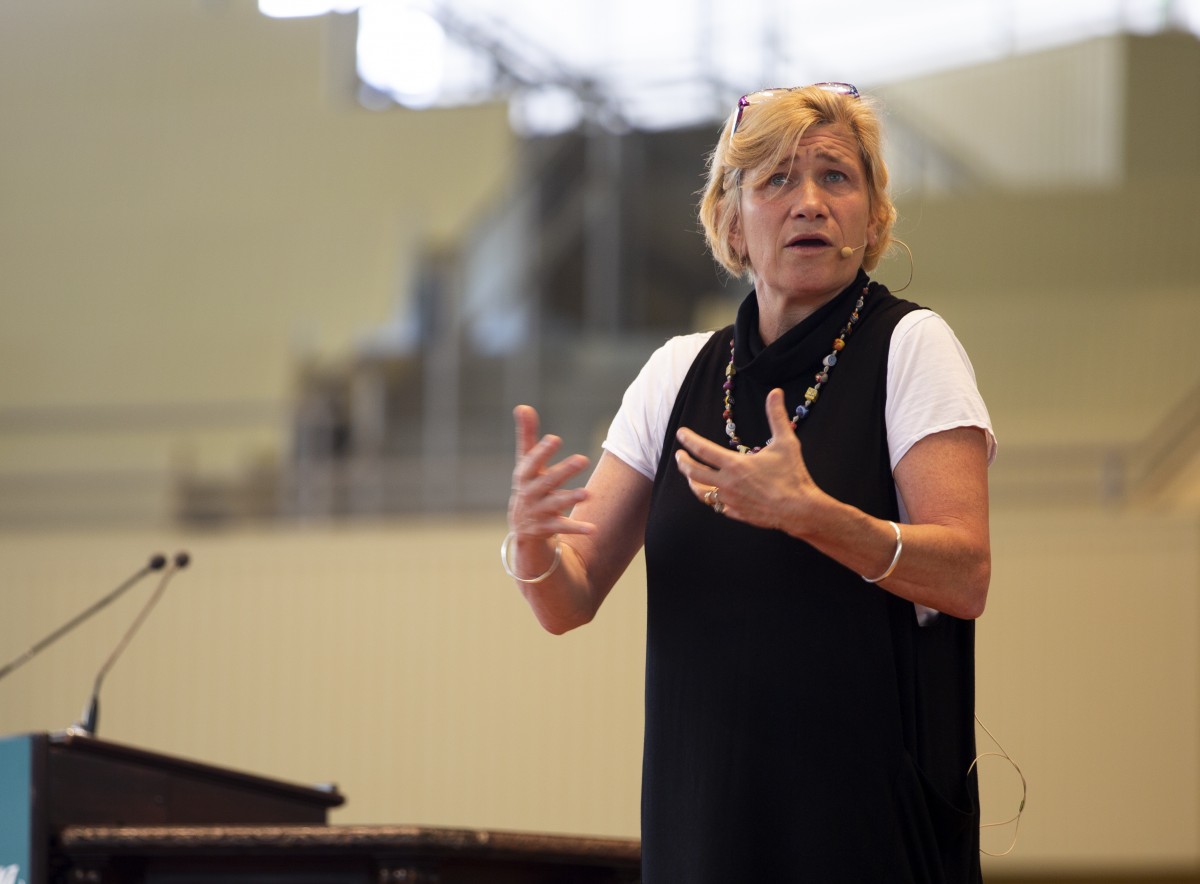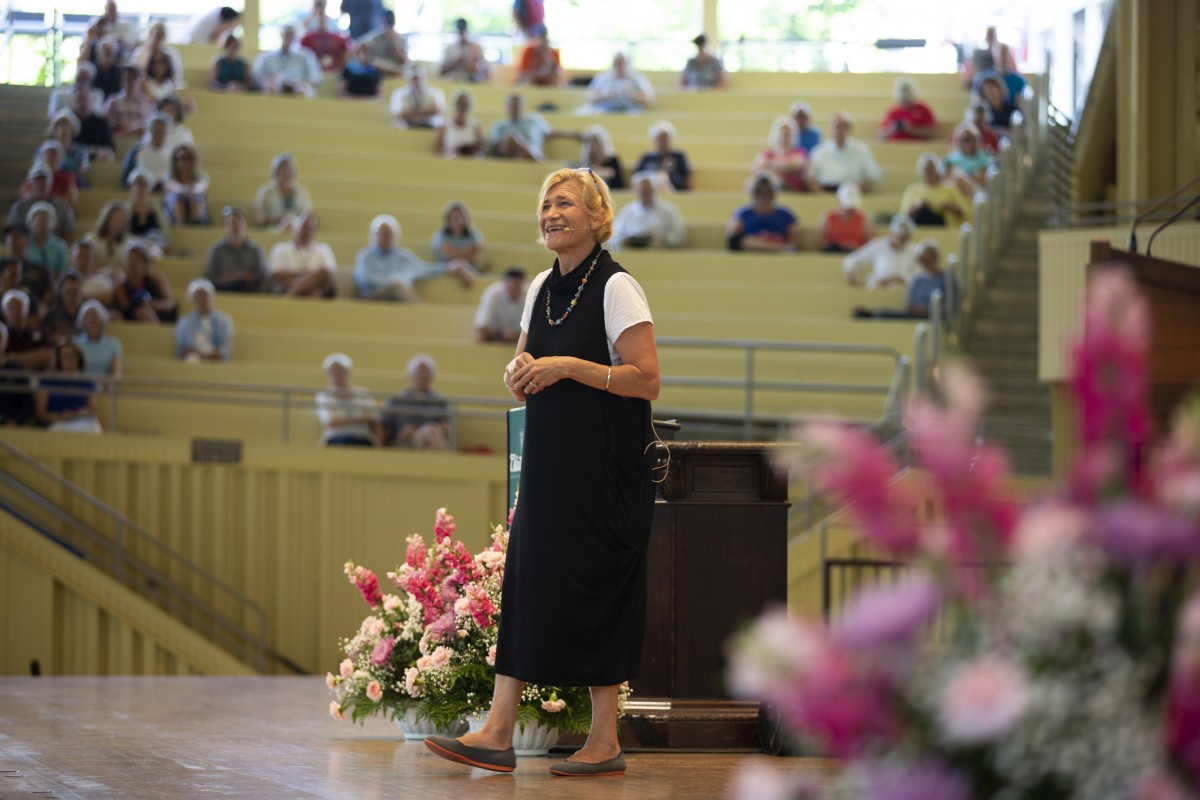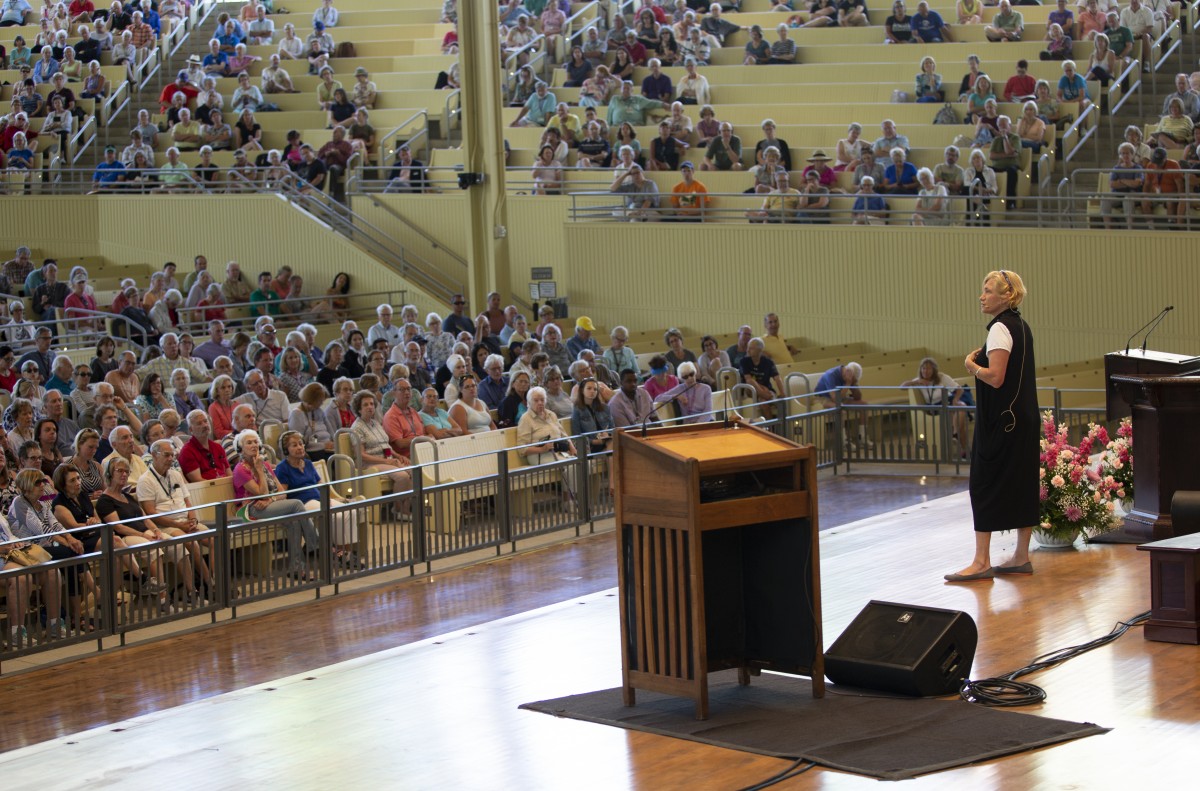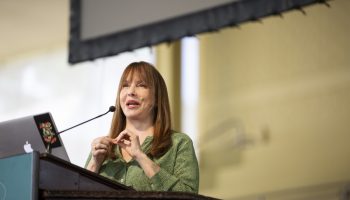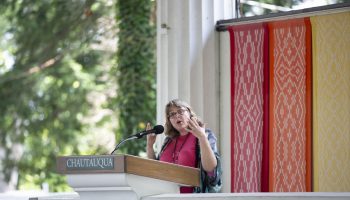Playworks founder and CEO Jill Vialet turned the Amphitheater into a playground at the 10:45 a.m. morning lecture Monday, July 9, when she kicked off Week Three’s theme “The Art of Play” with a game.
The game, appropriately titled “Stand Up,” required people to stand up or gesture in response to a number of statements.
“If you are a parent, stand up,” Vialet said.
Amp attendees swifty shifted into their appropriate positions. The questions continued, getting more specific as the game progressed. Vialet asked questions like, “Who listened to Justin Timberlake?” and “Who wore ‘powder blue’ to their prom?” (Chautauquans shared similar tastes in prom apparel).
Playing games is common for Vialet. Her nonprofit, Playworks, focuses on “the power of play” by bringing activities to children and schools across the country. Vialet’s inspiration for Playworks came during her tenure as executive director for the Museum of Children’s Art, which she founded with Mary Marx.
While visiting an elementary school as part of outreach work for the museum, Vialet was waiting in the dreaded school office as three miserable-looking boys emerged with their principal, who then ushered Vialet into her office. Despite her intent to talk about children’s art, the principal went off on a tangent and started venting about “why recess is hell.”
That was the “genesis of the idea,” Vialet said. She founded Playworks in 1996, coinciding with the birth of her first daughter. Both her “babies” are now 22 years old; her daughter just graduated from New York University and Playworks is projected to reach over 900,000 kids in 1,800 schools, and although they may seem like adults, both are still growing and learning, Vialet said.
“We started local, growing and growing and growing, and over the years, it’s been fascinating to watch why play is valued, what the justification is and how people rationalize making time for play in schools,” she said.
In recent years, Playworks’ research has been at the center of that justification.
Schools that have participated in Playworks have experienced increased feelings of safety among students, higher retention rates, increased physical activity and decreased rates of bullying compared to schools without recess programs, according to Vialet. Recess also teaches children important life lessons, she said.
“One of the great aspects of play, and making sure that kids have time to play in context of education, is that they really have the chance to lean in and come to experientially learn that most successes are predicated on multiple failed attempts,” she said.
Play is not limited to children, Vialet said. In Silicon Valley, companies are stressing the importance of play and how it sparks creativity and builds community. On Google’s campus, for example, there are beach volleyball courts and a culture that encourages employees to play.
“There was this recognition that optimal experiences are more often designed than they are discovered,” she said. “And so to maximize the likelihood of serendipitous things happening, infusing play into the process and helping bring out the best in people really changed the dynamic of the creative process — which is what brings me to entropy and the second law of thermo- dynamics.”
Vialet asked that the physicists in the audience not scoff if her metaphor was “ill-advised.” She said she finds comfort in the notion that a system without the necessary energy will fall apart. If it does, it doesn’t mean the system itself is a “degenerate,” it just means there wasn’t enough energy behind it.
In terms of the adult world, playful energy in the workplace increases the likelihood of having a positive return, and the same goes for schools.
“When I was talking to principals about why what (Playworks) did worked, they were often shocked,” she said. “They were surprised that play could have such an impact on their school’s culture and climate, … that this infusion of energy and this play could really help to bring out the best in not only the kids, but in the teachers.”
Vialet shared an anecdote that embodied the impact play has on students.
A Playworks employee Vialet called “Coach K” was warned about a student at her school who was “disruptive.” The student became involved with the Playworks intramural volleyball team and began to exhibit small, but noticeable, changes. Coach K was thrilled.
But during the last week of the Playworks’ program, the student became a “nightmare,” Vialet said. He stormed out of a match, called Coach K an inappropriate name and aimed a serve at another student. Traditionally, in this last week, Playworks concludes with an award ceremony where certain students are given honors.
Coach K was hesitant about giving this student an award, but per Vialet’s advice made him a “junior coach.” The student thanked Coach K, who in turn said it was a joy to coach him. The student teared up because Coach K saw his potential — the best he could be.
“We know from play that we need each other,” Vialet said. “And we believe actually that play has survived all these eons of evolutions, despite being a profoundly risky behavior, exactly because it teaches us how to navigate the messiness of our human independence. It teaches us to self-navigate, it teaches us how to collaborate, it teaches us essential skills that really make it possible to function in a democracy.”
But despite its being an instrumental part of life and identity, not everyone experiences play equally, and “who gets to play in America is telling,” Vialet said. From her research and experience, men are more likely to be playing as adults, and affluent schools are more likely to ensure that students have time to play.
“It is so easy to dismiss play as frivolous, as this extra thing, and yet my experience is that nothing can be further from the truth,” Vialet said. “That it is how we find ourselves and how we make connections with others. It creates this incredible opportunity that we see, and I would offer that in this moment in time, it’s never been more important.”
Following the conclusion of her lecture, Chautauqua President Michael E. Hill opened the Q-and-A by asking how the models of play have changed.
Vialet said the world has changed dramatically, but the fundamental need to play remains.
“I think what we’re seeing now is that there are fewer opportunities for kids to play outside in unsupervised environments,” Vialet said.
But apart from how technology is affecting play, there are also political influences altering the way children play.
“What I do, running kickball programs, feels not super-controversial,” she said, “and yet I get called a ‘recess fascist’ by people on the left and I get called a ‘vanguard of the Obama manuscript’ by people on the right. I must be doing a good job because I’m pissing everybody off.”
An audience member then asked if video games qualify as play, which Vialet answered by saying they did (in limited amounts).
Another attendee posed the question of how to make traditionally athletic games more accessible to those with disabilities or those who are not athletically gifted.
She said that play is adaptable, no matter the season or resources (children even play four square in the Minnesota winter by drawing lines with Kool-Aid in the snow).
Play is not about “finger wagging” or saying “you’re going to play together,” Vialet said; it’s about building trust and rapport as an opportunity for inclusion.
For Vialet, play is about collaborating and interacting with new and different people. Play is not exclusive to any one person — it’s for introverts and extroverts alike; girls, boys and nonbinary children alike; and abled and differently-abled alike.


